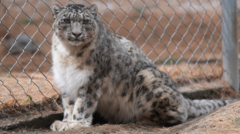Snow leopards, majestic creatures inhabiting the rugged landscapes of Central Asia, face a perilous future with their declining population, estimated at 4,000 to 6,000 in the wild. In Pakistan-administered Gilgit-Baltistan, human-animal conflict exacerbates this crisis and threatens both local farmers and the fragile ecosystem. One orphaned snow leopard named "Lovely," unable to fend for herself in the wild, symbolizes the broader struggles of her species.
Each year, between 221 to 450 snow leopards are killed, primarily in retaliation for livestock losses, prompting a 20% decline in their numbers over the past two decades. In response, the WWF has collaborated with LUMS to develop AI-driven cameras that can detect snow leopards and send immediate alerts to nearby villagers about their presence, thus prompting them to relocate their livestock to avoid conflict.
These advanced camera systems are strategically set up in challenging terrains, leveraging solar power and batteries capable of withstanding severe weather conditions. Asif Iqbal, a conservationist with WWF Pakistan, describes the technology's potential and showcases its ability to properly identify humans and animals, offering hope for a more symbiotic coexistence between villagers and these elusive big cats.
However, the implementation hasn't been without complications; initial skepticism from the local communities posed a significant hurdle, leading to instances of vandalism against the devices. Sensitivity towards cultural practices, especially concerning women's privacy, has also influenced camera placements.
For local farmers like Sitara, who lost numerous sheep to snow leopards, the effectiveness of AI alarms remains uncertain. Many villagers express doubt about the technology's reliability, given their limited mobile service in the high-altitude areas.
While some community members are beginning to recognize the ecological importance of snow leopards in controlling grazing patterns, others remain conflicted due to losses incurred from livestock attacks. Factors such as climate change further compound the issue, prompting farmers to encroach on snow leopard habitats in search of suitable grazing grounds.
Despite these challenges, WWF highlights legal deterrents that have resulted in jail sentences for poachers, signifying a shift towards conservation. The organization plans to enhance its strategy by introducing additional deterrents like sounds and scents, aiming to dissuade snow leopards from approaching human settlements.
The WWF and LUMS's initiative demonstrates the potential synergy between technology and conservation, reinforcing the need for ongoing efforts to protect these "ghosts of the mountains" amidst the complexities of rural livelihoods and environmental stewardship.






















